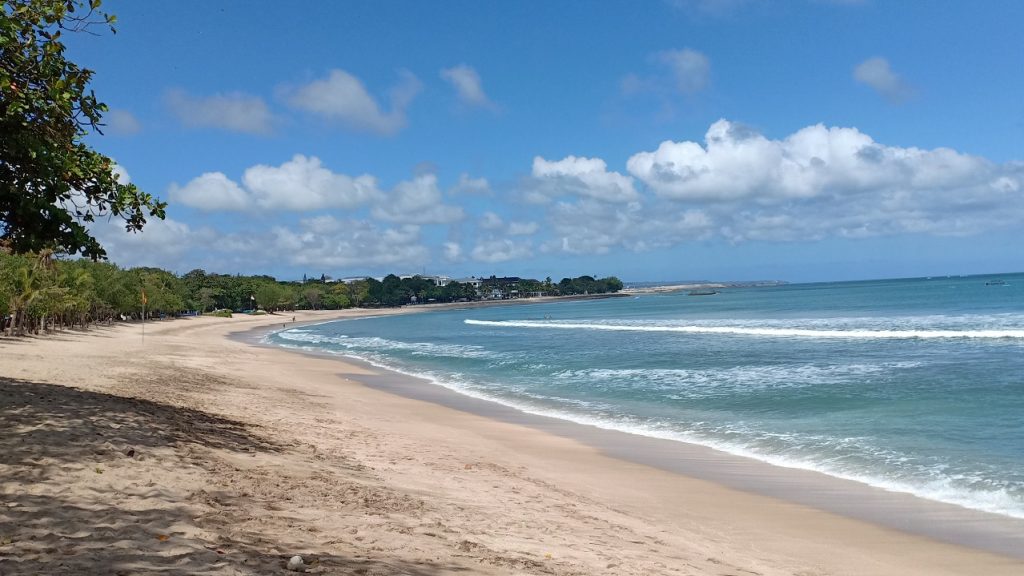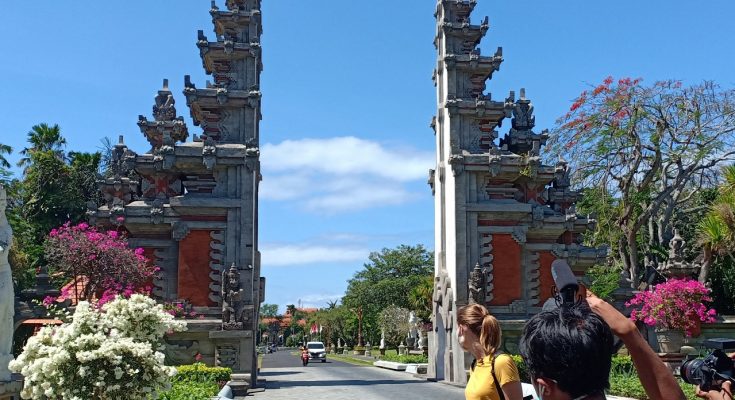1. The COVID-19 pandemic that happened in 215 countries in the world, including Indonesia and Bali, has an extensive and serious impact in various living sectors, health, social, and economy, including tourism, which applies to the Balinese community in general. 2. In handling the COVID-19 pandemic, in accordance with direction and policy from central government, TNI/Polri, Attorney, Bali provincial government together with city/municipality governments in Bali, traditional village council (Majelis Desa Adat), religious council (Majelis Keagamaan), traditional village, village / Kelurahan, and society components have work together, both in seen and unseen universe, so Bali can achieve a good result in controlling the COVID-19 pandemic. This good result is marked by the controlled number of new positive cases (total cumulatively of 4,024 cases), high recovery rate (3,532 persons, 87.77%) and thanks to God, the number of fatality in Bali due to COVID-19 is relatively low (49 persons, 1.2%). 3. The impact of COVID-19 pandemic to Bali economy is apparent, i.e. ceased tourism, the decline in income from sales for micro, small and medium enterprises and cooperatives, the decline in sales of agricultural products and community hand-made crafts, that caused Bali economic growth to contract (negative growth) on the 1st quarter of -1,14% and on 2nd quarter of -10,98%. 2,667 workers in the formal sector of tourism industry have been laid off and 73,631 are on unpaid leave. 4. Therefore, two things must be done simultaneously, firstly, improvement in handling COVID-19 bearing in mind until present there is not yet a vaccine or medicine. Secondly, start activities and efforts to recover the economy for the community livelihood. 5. The Governor of Bali, together with heads of municipality / city have agreed to implement community activity that is productive and COVID-19 safe gradually, selective and limited by implementing the new era life order protocols.The phases are as follows: Phase one, implement limited and selective activities only for local Bali community scope, from uly 9, 2020 that falls on the good date, Umanis Sinta Thursday. For this first phase, according to directives from national task force for acceleration of COVID-19 management, the new era life order implementation, which allows limited to the following sectors: a) health; b) government offices; c) tradition and religion; d) financial, industry, trade, logistic, transport, cooperative MSME, traditional market, modern market, restaurant and hawkers; e) agriculture, plantation, marine/fishery, and husbandry; and f) service and construction. Phase two, implement wider activities including tourism sector, but limited to domestic tourists from July 31, 2020 that falls on the good date, Pon Kulantir Friday. Phase three implement extensive activities in tourism sector, including for international tourist, starting on September 11, 2020 that falls on the good date, Kliwon Sungsang, Sugihan Bali Friday.

6.The first and second phase activity has been relatively well and successful. Evaluation results show that the first and second phase activity does not affect the COVID-19 cases, there has been no increase and no new clusters. New cases are under control, recovery rate is increasing and fatality rate is under control. Since opening on July 31, 2020 the number of domestic tourists entering Bali through the I Gusti Ngurah Rai airport has increased more than 100%. Until August 14, 2020, the number of domestic tourists at I Gusti Ngurah Rai airport reached around 2,300-2,500 persons per day. 7. Related to phase three plans, opening tourism to international tourists must consider the following: a. The effective regulation from Republic of Indonesias Minister of Law and Human Rights number 11 of 2020 temporary ban for foreigners to enter the Republic of Indonesia territory. b. Government of Indonesia still applies policy that forbids its citizens to go abroad, at least until end of 2020. Also, the government of Indonesia has not opened entrance for international tourists into Indonesia until end of 2020, because Indonesia is still categorized as a red zone. The situation in Indonesia is not conducive to allow international tourists to visit Indonesia, including visit Bali. c. World countries have not applied policy to allow their citizens to travel abroad. Some countries even apply strict limitation on citizen activities because the COVID-19 pandemic continues to increase and threats the health and safety of their citizens. For example, Australia, whose citizens are the major visitor to Bali, only plans to allow their citizens to travel in 2021. Similarly for China, Korea, Japan and European countries. d. Principally, the central government supports the Bali province government plans to recover tourism, by opening the doors for international tourists. However, this requires care, prudency, not rushed, and requires careful preparation. This is because Balis position as the main world destination, which is highly dependent on world community trust to Indonesia, including Bali. Balis tourism recovery efforts must not fail, because it will have a bad impact on Indonesias and Balis image internationally, which will be contra-productive to the tourism recovery initiatives. e. The central government provides direction to Bali provincial government to refine the procedure, system and infrastructure so Bali tourism recovery efforts can be implemented successfully, while maintaining control on the COVID-19 pandemic. Related to when international tourism will be reopened, is highly depends on the assessment on both domestic and international situations. 8. Therefore until end of 2020, the Bali provincial government will optimize efforts to bring in domestic tourist to Bali to recover Balis tourism and economy sector.





